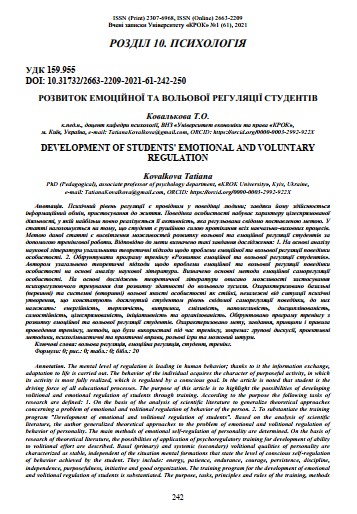DEVELOPMENT OF STUDENTS' EMOTIONAL AND VOLUNTARY REGULATION
DOI:
https://doi.org/10.31732/2663-2209-2021-61-242-250Keywords:
volitional regulation, emotional regulation, student, trainingAbstract
The mental level of regulation is leading in human behavior; thanks to it the information exchange, adaptation to life is carried out. The behavior of the individual acquires the character of purposeful activity, in which its activity is most fully realized, which is regulated by a conscious goal. In the article is noted that student is the driving force of all educational processes. The purpose of this article is to highlight the possibilities of developing volitional and emotional regulation of students through training. According to the purpose the following tasks of research are defined: 1. On the basis of the analysis of scientific literature to generalize theoretical approaches concerning a problem of emotional and volitional regulation of behavior of the person. 2. To substantiate the training program "Development of emotional and volitional regulation of students". Based on the analysis of scientific literature, the author generalized theoretical approaches to the problem of emotional and volitional regulation of behavior of personality. The main methods of emotional self-regulation of personality are determined. On the basis of research of theoretical literature, the possibilities of application of psychoregulatory training for development of ability to volitional effort are described. Basal (primary) and systemic (secondary) volitional qualities of personality are characterized as stable, independent of the situation mental formations that state the level of conscious self-regulation of behavior achieved by the student. They include: energy, patience, endurance, courage, persistence, discipline, independence, purposefulness, initiative and good organization. The training program for the development of emotional and volitional regulation of students is substantiated. The purpose, tasks, principles and rules of the training, methods used during the training are described, They include: group discussions, projective methods, psychogymnastic and practical exercises, role games and brainstorming.
Downloads
References
Вачков И. В. Психология тренинговой работы: содержательные, организационные и методические аспекты ведения тренинговой группы. Москва : Эксмо, 2007. 416 с.
Габдреева Г. Ш. Практикум по психологии состояний: учебное пособие. СПб: Речь, 2004. 480 с.
Гаврилькевич В. К. Иерархические уровни эмоциональной саморегуляции личности как объект психодиагностики. Настоящи изследвания – 2009 : материали за 5-а Международна научна практична конференция (17-25 януари 2009). Т. 8. Педагогически науки. Психология и социология. Музика и живот. Физическа култура и спорт. София : «Бял ГРАД-БГ» ООД, 2009. С. 44–50.
Ильин Е. П. Психология воли. 2-е изд. СПб. : Питер, 2009. 368 с.
Калин В. К. Психорегулирующая тренировка как средство повышения способности к волевым усилиям. Проблемы психологии воли. 1974. С. 94-112.
Капитоненко Н. В. Эмоциональная регуляция поведения : области изучения, компоненты и функции. Психологическая наука и образование. 2007. № 5. С. 267-274.
Клименко B. B. Психофізіологічні механізми праксису людини : монографія. Київ : Видавничий Дім «Слово», 2013. 640 с.
Ковалев О. Г. Волевая саморегуляция несовершеннолетних осужденных женского пола. М. : «Права человека», 2001. 72 с.
Ковалькова Т. О. Регулювання емоцій студентів за допомогою тренінгової роботи методами когнітивної психотерапії. Правничий вісник Університету «КРОК». 2017. Вип. 28. С. 167-175.
Конопкин О. А. Структурно-функциональный и содержательно-психологический аспекты осознанной саморегуляции. Психология. Журнал Высшей школы экономики. 2005. Т. 2. № 1. С. 27-42.
Корольчук М. С. Психофізіологія діяльності : підруч. для студ. вищ. навч. закл. К. : Ельга, 2011. 400 с.
Макшанов С. И. Методическая подготовка специалистов в области тренинга. СПб. : Институт тренинга, 2000. 301 с.
Марасанов Г. И. Социально-психологический тренинг. 5-е издание, стереотипное. Москва : Когито-Центр : МПСИ, 2007. 251 с.
Мілютіна К. Л. Теорія та практика психологічного тренінгу. Київ : МАУП, 2004. 192 с.
Моросанова В. И. Самосознание и саморегуляция поведения. Москва : Институт психологии РАН, 2007. 213 с.
Неменский Б. М. Эмоционально-образное познание в развитии человека. Вопросы психологии. 1991. № 3. С. 9-16.
Носенко Е. Л. Емоційний інтелект: концептуалізація феномену, основні функції : монографія. Дніпропетровський національний ун-т. Київ : Вища школа, 2003. 126 с.
Пашукова Т. И. Практикум по общей психологи. Москва : Институт практической психологии; Воронеж : НПО «Модек», 1996. 176 с.
Прохоров А. О. Саморегуляция психических состояний: феноменология, механизмы, закономерности. Москва : ПЕР СЭ, 2005. 352 с.
Сингаївська І. В. Соціально-психологічний тренінг особистісного зростання як метод розвитку життєвої компетентності особистості. Кроки до компетентності та інтеграції в суспільство. 2000. С. 122–125.



